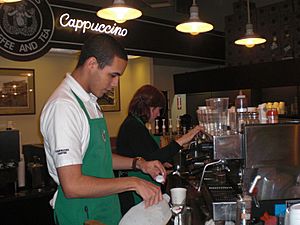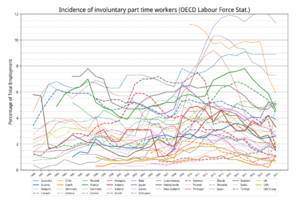Underemployment facts for kids

Underemployment happens when a person has a job, but it's not a good fit for them. This can mean a job doesn't use their skills, is only part-time when they want full-time, or leaves them with not enough to do.
It's different from unemployment, where a person can't find any job at all. Underemployment means someone is working, but their skills or time are not being used fully.
In simple terms, underemployment can happen in a few ways:
- Overqualification: This is when someone has a lot of education, skills, or experience, but their job doesn't need all of it. For example, a trained doctor from another country might work as a taxi driver because their medical degree isn't recognized.
- Involuntary Part-Time Work: This is when people want to work full-time but can only find part-time jobs. They want more hours but can't get them.
- Hidden Unemployment: Sometimes, businesses or even whole economies employ more workers than they really need. This might be because of rules that make it hard to let people go, or because the work is only busy at certain times of the year.
Underemployment can be a big reason for poverty. Even if someone has a part-time job, the money they earn might not be enough to cover their basic needs. This problem is common in developing countries, where many people do small, occasional jobs just to get by.
Contents
When Skills Aren't Used
One common type of underemployment is when people with high skills and postsecondary education (like a college degree) work in jobs that are low-skilled or pay very little. Imagine someone with a college degree working as a bartender or on a factory assembly line.
This can happen if there aren't enough jobs that match their skills. People might take any job they can find to pay their bills. It can also affect people who face discrimination, don't have the right trade certifications for their new country, have disabilities, or have been in prison.
New Graduates & Immigrants
Two groups often face this kind of underemployment:
- Immigrants: When highly trained people move to a new country, their education or work experience from their home country might not be accepted. Doctors or engineers might not be able to work in their field and have to take jobs that don't use their professional skills.
- New Graduates: Young people who just finished college might have the right training for a job, but they lack experience. A new graduate with a degree in accounting might have to work as a barista or store clerk until they find a job in their chosen field.
Skills Not in Demand
Another reason for underemployment is when someone has skills that the job market doesn't need much. For example, some college degrees, especially in the liberal arts, produce more graduates than there are jobs for them. Employers sometimes ask for higher degrees than are truly needed for a job because there are so many graduates available.
If college graduates stay underemployed for a long time, the skills they learned in school can get rusty or become outdated. For instance, someone with a PhD in English literature has great research skills, but if they work as a store clerk for years, those skills might not be used.
When the Economy Isn't Fully Used
Underemployment can also describe places where there aren't enough jobs or training opportunities. This might be due to a lack of services like childcare or public transportation. People in these areas might stop looking for work because it seems so hard to find a regular job. These people are sometimes called discouraged workers.
In a bigger picture, economists use "underemployment" to mean when there are more people out of work than what is considered normal for a healthy economy. This shows that the economy isn't producing as much as it could because people aren't working.
When Workers Aren't Busy Enough
A third way to think about underemployment is when businesses or entire economies employ workers who don't have enough to do. This is sometimes called "hidden unemployment." It means employees are not being as productive as they could be.
This can happen for several reasons:
- Rules and Laws: Some countries have strict laws or strong unions that make it hard for companies to fire or lay off workers. So, even if a company doesn't need as many employees, they might keep them on the payroll.
- Seasonal Work: Some jobs are very busy only at certain times of the year, like accounting firms during tax season, agriculture, or the hospitality industry. Companies might keep staff during slow times to make sure they have them when it gets busy again.
- Company Culture: In some countries, like Japan, companies have a tradition of keeping workers even during tough economic times. They value loyalty and see it as their duty to keep employees.
This kind of underemployment is different from jobs like firefighters or lifeguards, who spend time waiting for emergencies. Their "waiting time" is part of their job because they need to be ready for action.
Sometimes, companies might keep more workers than needed during a recession or economic depression. They might see it as an investment, hoping to keep skilled staff so they don't have to hire and train new people when the economy improves. For example, Airbus was able to grow faster than Boeing because it kept more of its staff during slow times, so it was ready to increase production quickly when demand returned.
The tourism sector also shows this. Companies that run tours for foreign tourists might keep staff who speak specific languages, even in the off-season, because it's hard to find new people with those skills.
See also
 In Spanish: Subempleo para niños
In Spanish: Subempleo para niños
- Unemployment
- Overqualification
- Working poor
 | Precious Adams |
 | Lauren Anderson |
 | Janet Collins |


